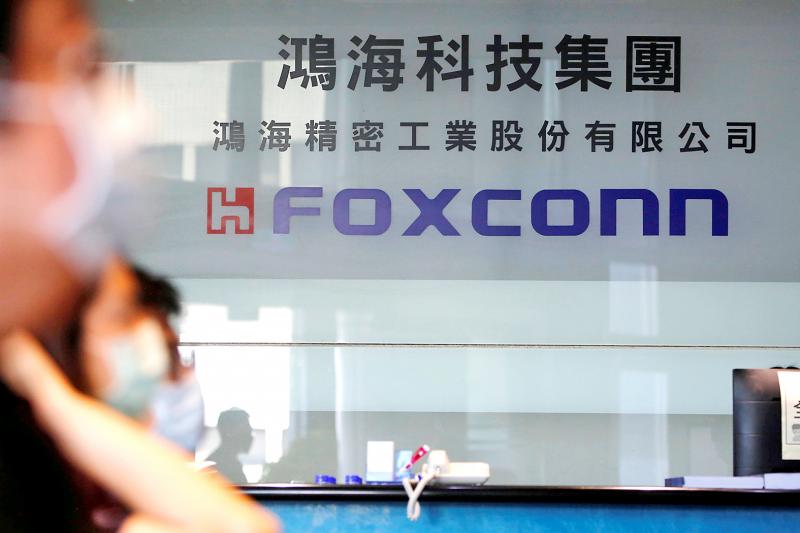Hon Hai Precision Industry Co (鴻海) yesterday reported revenue of NT$420.55 billion (US$14.24 billion) for last month, up 4.27 percent month-on-month and 5.45 percent year-on-year.
The figure was a company record high for the month of August, which an official attributed to gains in sales of its consumer electronics, components, computer peripherals and cloud computing businesses.
Consumer electronics posted the largest monthly increase, while computer peripherals recorded the biggest annual increase, the official said.

Photo: Ann Wang, Reuters
Cumulative revenue for the first eight months of the year totaled NT$2.88 trillion, down 4.37 percent from a year earlier, company data showed.
Hon Hai on Aug. 12 told an investors’ conference that third-quarter revenue would be higher than the second quarter, but lower than a year earlier.
Separately, leading industrial PC maker Advantech Co Ltd (研華) yesterday reported that revenue dropped for a second straight month to NT$4.3 billion last month, down 10.99 percent from a year earlier.
Sales at its industrial Internet-of-things and applied computing divisions expanded year-on-year last month, but its other divisions saw sales decline.
By destination, Europe and South Korea were its largest markets last month, a company press release said.
In the first eight months of the year, Advantech’s revenue dropped 4.71 percent year-on-year to NT$34 billion, the company said.
Sales in Taiwan, China and South Korea grew annually, while those in the US and Europe slid, the company said.
Advantech president of general management Eric Chen (陳清熙) on July 31 said that he was conservative about the company’s business performance in the third quarter, with some customers having postponed their shipment since June.

CHIP RACE: Three years of overbroad export controls drove foreign competitors to pursue their own AI chips, and ‘cost US taxpayers billions of dollars,’ Nvidia said China has figured out the US strategy for allowing it to buy Nvidia Corp’s H200s and is rejecting the artificial intelligence (AI) chip in favor of domestically developed semiconductors, White House AI adviser David Sacks said, citing news reports. US President Donald Trump on Monday said that he would allow shipments of Nvidia’s H200 chips to China, part of an administration effort backed by Sacks to challenge Chinese tech champions such as Huawei Technologies Co (華為) by bringing US competition to their home market. On Friday, Sacks signaled that he was uncertain about whether that approach would work. “They’re rejecting our chips,” Sacks

NATIONAL SECURITY: Intel’s testing of ACM tools despite US government control ‘highlights egregious gaps in US technology protection policies,’ a former official said Chipmaker Intel Corp has tested chipmaking tools this year from a toolmaker with deep roots in China and two overseas units that were targeted by US sanctions, according to two sources with direct knowledge of the matter. Intel, which fended off calls for its CEO’s resignation from US President Donald Trump in August over his alleged ties to China, got the tools from ACM Research Inc, a Fremont, California-based producer of chipmaking equipment. Two of ACM’s units, based in Shanghai and South Korea, were among a number of firms barred last year from receiving US technology over claims they have

BARRIERS: Gudeng’s chairman said it was unlikely that the US could replicate Taiwan’s science parks in Arizona, given its strict immigration policies and cultural differences Gudeng Precision Industrial Co (家登), which supplies wafer pods to the world’s major semiconductor firms, yesterday said it is in no rush to set up production in the US due to high costs. The company supplies its customers through a warehouse in Arizona jointly operated by TSS Holdings Ltd (德鑫控股), a joint holding of Gudeng and 17 Taiwanese firms in the semiconductor supply chain, including specialty plastic compounds producer Nytex Composites Co (耐特) and automated material handling system supplier Symtek Automation Asia Co (迅得). While the company has long been exploring the feasibility of setting up production in the US to address

OPTION: Uber said it could provide higher pay for batch trips, if incentives for batching is not removed entirely, as the latter would force it to pass on the costs to consumers Uber Technologies Inc yesterday warned that proposed restrictions on batching orders and minimum wages could prompt a NT$20 delivery fee increase in Taiwan, as lower efficiency would drive up costs. Uber CEO Dara Khosrowshahi made the remarks yesterday during his visit to Taiwan. He is on a multileg trip to the region, which includes stops in South Korea and Japan. His visit coincided the release last month of the Ministry of Labor’s draft bill on the delivery sector, which aims to safeguard delivery workers’ rights and improve their welfare. The ministry set the minimum pay for local food delivery drivers at